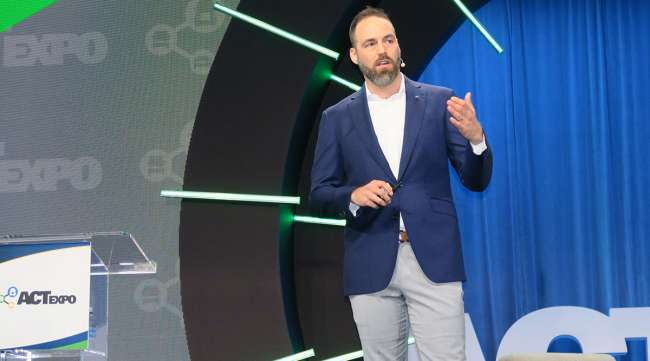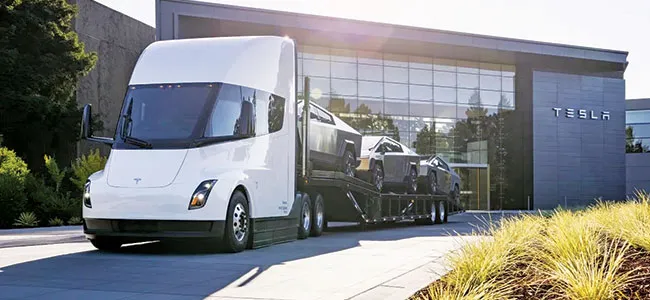Features Editor
Tesla’s Priestley to EV Fleets: Now Is the Time to Scale

[Stay on top of transportation news: Get TTNews in your inbox.]
LAS VEGAS — In a rare trade show appearance for the company, the head of Tesla’s heavy-duty truck program stressed that electric truck technology is ready for prime time and capable of handling commercial fleets’ needs, even as he joked about his own company’s delays in getting its fully electric Class 8 Semi model to market.
“We are technologically ready. Electrification can be done. Now, it’s time for scaling,” said Dan Priestley, senior manager of the Tesla Semi, during a May 20 main stage address at ACT Expo 2024. “Electric is efficient. It allows you to move more goods with less energy. Plain and simple.”
The recipe for success for the Tesla Semi, Priestley said, is power and efficiency at a low operating cost — despite the price premium it and other EVs command over diesel-powered units. “For heavy or fast charging, we can take that difference in cost and greater efficiency and push as many miles and tons through that to give you the absolutely fastest economic payback possible,” Priestly said.
RELATED: Tesla Promises Semi Truck Production to Begin in Late 2025
Priestley noted that Semi models have to date traveled more than 3.5 million miles within the United States, even as delays have stalled broader commercial rollout.
“I know there have been questions on timing,” Priestly joked, alluding to the long wait for full production since the Semi was introduced in 2017. “But Tesla has a specialty in turning the impossible into merely late.”

Priestley noted that Semi models have to date traveled more than 3.5 million miles within the United States, even as delays have stalled broader commercial rollout. (Tesla)
He touted the truck’s performance in various test runs across challenging roads and conditions, including California’s Donner Pass. He also discussed plans to develop a complementary heavy-duty technician service to help fleets build their electric fleets to scale.
“We’re going to leverage the fact that we develop our own service skills in-house,” Priestley said. “We do our own training and develop physical as well as virtual information to allow technicians to do their job effectively and ultimately get the truck back into the world, earning as much money as possible.” Priestley stressed that the success of its pilot fleet has shown that the industry is not only ready for electrification but is able to scale up significantly.
Every day, the Tesla Semi demonstrates that battery electric trucks can directly replace diesel trucks. With our own fleet of Semis, Tesla has shipped >20,000 battery packs out of Gigafactory Nevada to support Fremont vehicle builds. These trucks run the same route, carrying the… https://t.co/KO9eQO2IV3 — Dan Priestley (@danWpriestley) March 29, 2024
To help propel that goal, Tesla is building a Nevada manufacturing facility in anticipation of ramping up customer deliveries of the Semi in 2026 with an eventual target production capacity of 50,000 units per year, he said. In the meantime, Tesla is rolling out more of the tractors to its early customers. Priestley noted that initial customer PepsiCo Inc. is beginning to take delivery of an additional 50 Tesla Semis at its Fresno, Calif., facility. PepsiCo ranks No. 1 on the Transport Topics Top 100 list of the largest private carriers in North America.
Priestley also assured the audience that Tesla is dedicating resources to building its charging infrastructure.
“This year, we are investing more than $500 million in new Supercharger stations, expanding the network,” he said. “We are committed to providing our customers with the greatest supercharging experience, and we are going to extend that to the heavy-duty side as well.”
RELATED: Tesla Axes Supercharger Team in Blow to Broader EV Market
Tesla still plans to grow the Supercharger network, just at a slower pace for new locations and more focus on 100% uptime and expansion of existing locations — Elon Musk (@elonmusk) April 30, 2024
Priestley added that Tesla also is working to streamline engineering, procurement and construction challenges that exist for deploying heavy-duty charging.
Want more news? Listen to today's daily briefing above or go here for more info
“Right now we see a lot of numbers out there for charging for heavy-trucks trucks,” he said, pointing to a commonly cited example of $1,000 per kilowatt. “We see a direct path that — at the start of our charging to support our high-volume product — to cut that number in half to $500 per kilowatt, fully deployed to the customer.”
Priestley closed by calling on other manufacturers and fleets to continue to develop and deploy electric trucks.
“This is going to be an awesome journey. It’s going to be hard, but it’s absolutely necessary,” he said. “The time is now. A failure to act is a failure overall.”




